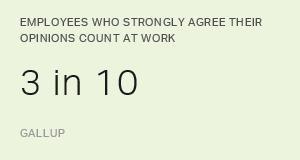Story Highlights
- European employees lack confidence in their company's ethics
- Managers who proactively talk about compliance can help
- Leaders can create a culture that encourages employees to speak up
When Gallup workplace research asked European employees what they think about their company's and colleagues' ethics and compliance, alarming trends were revealed.
Based on The Real Future of Work research:
- One out of four (25%) French, German, Spanish and U.K. workers trust their company will always do the right thing rather than solely seek their own profit advantage.
- Roughly one in three (34%) workers believe their company would never lie to customers or conceal information that is relevant to them.
- Fewer than three in 10 (29%) European employees are convinced their coworkers always do the right thing for their customers.
Based on the same study, compliance training programs produced few results -- there's no significant difference between respondents who participated in compliance training and those who didn't:
35% of employees who've been trained and 33% of those who haven't strongly agree with the statement, "I believe that my company would never lie to our customers or conceal information that is relevant to them."
However, among those few -- 32% -- who say their manager and team frequently and proactively discuss ethical behavior in their business, 49% of that group say their company would never deceive its customers.
How the Manager Can Improve Workplace Ethics and Compliance
The difference is probably attributable to management. Proactive managers give employees opportunities to practice challenging, discussing, and fine-tuning their moral compass, resulting in employees who have a greater awareness of their ethical responsibilities.
For this reason, managers need to make business integrity, ethics and compliance a regular topic of conversation to familiarize employees with these topics and give them practice discussing their implications.
It's up to the manager to initiate those conversations and opportunities. Managers are the ultimate architects of trust on a team and their job is to empower and motivate employees. They are the source of implicit and explicit cultural norms.
For that reason, managers need to address ethical dilemmas in the workplace openly and without hesitation -- and before problems arise. This should be done through clear expectations as well as relevant work-related examples.
Correcting unacceptable behavior can be done productively and it can be engaging in a conversation that explains, "That's not how we do things here, and this is why." But correction may not be necessary if managers set expectations early and often. A well-calibrated moral compass helps employees act with integrity and make decisions about ethics and compliance that are appropriate to the situations that arise.
This does not mean that managers need to start each meeting with a list of integrity, ethics and compliance how-tos.
Rather, it's about regularly putting topics on the agenda that cause employees to think and talk about real-life integrity and ethical issues in business. That makes compliance a matter of course for employees and enables them to meet dilemmas in the workplace with at least some experience, even if only in hypothetical discussions.
And addressing compliance at the local level is a component of risk management -- risks that can include litigation, legal fees, fines, loss of customer trust, negative employer brand, turnover -- because it weaves compliance into the agenda of the entire company.
A Leader's Role in Organizational Integrity
Although managers are the most local mechanism of integrity, ethics, and compliance, leaders create the cultures that encourage ethical behavior in the workplace.
An authoritarian style of leadership prevents opposition and curtails critical thought -- both of which are necessary to challenge bad actions and bad actors. On the other hand, cultures that prompt employees to reflect on and question workplace scenarios without fear give employees a platform for their concerns about serious ethical problems.
For example, data from Germany in 2016 found that employees who said their managers treat them more as a partner than a subordinate -- i.e., managers who eschew traditional command-and-control leadership -- voiced their concerns considerably more frequently than employees of authoritarian leaders.
When workers who are treated like their manager's partner had grave concerns, 26% refrained from sharing them at least once compared with 47% of those whose boss treated them like a subordinate.
And 31% of the workforce in that same study admitted they kept silent about a serious concern at least once in the past 12 months -- one in five of them said they were silent three or more times in that same period about apprehension in the workplace.
Cultures that prompt employees to reflect on and question workplace scenarios without fear give employees a platform for their concerns about serious ethical problems.
The implications of this are alarming. If your employees are reluctant to raise a red flag, noncompliance issues will be harder to catch before they become disasters -- and public knowledge -- especially as Europe enters a severe economic contraction. And right now, more than half of employees doubt their companies are committed to integrity. They're even more skeptical that their coworkers are. Compliance training in most companies isn't accomplishing what leaders intended.
The situation needs to improve. It can be done with the commitment of managers and reinforcement from leaders -- and time is of the essence. No company can afford consumer backlash about failures of integrity when every company needs all the customers it can get.





